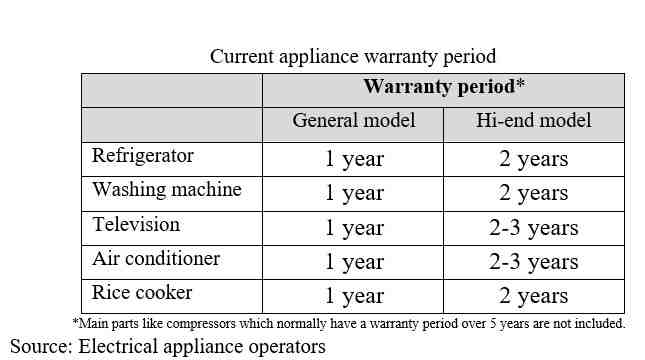On November 22, 2022, the Thai Cabinet approved in principle the draft Product Liability Act B.E., which mandates operators to take responsibility for product defects for two years from the delivery date in order to protect consumer rights, especially for technology products where defects are hard to detect at the time of purchase, including a wide range of electrical appliances widely used by consumers. If such draft Act is passed in the parliament and enforced, it should help drive the Thai electrical appliances market towards products with higher standard quality, but will have little impact on the operating cost of operators, especially those that already have produced or sold qualified products.
Currently, electrical appliances in the Thai market normally come with at least a 1-year warranty, and consumers are often reluctant to take the time and trouble to make a claim if the product is slightly damaged but still works. As a result, the overall cost of claims for defective products in the industry at present is not very high and accounts for only approximately 0.23% of sales amount1, most of which are spare parts for repair in case that the product malfunctions.

Going forward, after the draft Act is promulgated, the warranty period of general electrical appliances for the mass market, which usually provides only a 1 year of warranty period, must be extended to at least 2 years as required by the new Act. This may have some impact on business operations, especially for products that were not originally warranted, but it should be few. Meanwhile, the draft Act will not cause much change to the models and features of products on the market, and therefore is unlikely to affect the selling prices.
Import dealers with lower margin from selling products and weaker bargaining power than foreign brand owners may have to adjust to mitigate the impact, such as focusing on selling products with warranties from brand owners or higher quality standards, and gradually reducing sales of products without warranties from the brand owners. Nonetheless, the adaption approach still depends on each business operator, as its cost to profit ratio, brand image and target customer are varied.
Overall, the impact of the draft Act on the electrical appliances market and the prices will be limited. However, given the intense competition and the large number of operators in the Thai electrical appliances market, and the declining brand loyalty of consumers, especially the new generation, business operators therefore need to focus on quality, value for money and good after sales service. This is particularly true at a time when the Thai economy is just beginning to recover amid the risks of a global recession and when inflation pressure may depress consumer purchasing power and domestic demand for electrical appliances going forward, as the sales of domestic electrical appliances during the first 9 months of 2022 contracted by 2.5%YoY.
-----------------------------------------------------------------------------
1 Projected from 2015 Input-Output Table
Scan QR Code

Annotation
This research paper is published for general public. It is made up of various sources. Trustworthy, but the company can not authenticate. reliability The information may be changed at any time without prior notice. Data users need to be careful about the use of information. The Company will not be liable to any user or person for any damages arising from such use. The information in this report does not constitute an offer. Or advice on business decisions Anyhow.